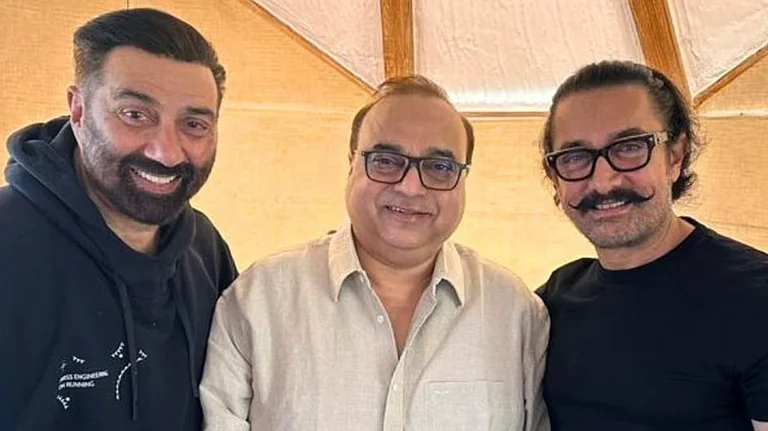On every dusty evening, the number of people perched on the parapet of Marine Drive in Mumbai is essentially divisible by two, although their mood is to multiply. Hundreds of boys and girls, men and women, sit huddled in a democratic string of pre-conjugal nodes that in an astounding sense of fair play, more than mere foreplay, leaves a two-foot gap between each performing couple. Their sheepish backs are turned to the milling traffic while they face the sea. If somehow a sudden almighty silence were to descend on Marine Drive one day, it is said you would be able to hear a thousand bra straps snap.
Condemned to love and libido, this predominantly working class wouldnt do it in public if only they had some private space or affordable seedy hotels. Its this miserable existence that is in danger with the police being nebulous about what they will permit and what they will not. After a reported ban on kissing and even sitting facing the sea, Marine Drive and other seafaces have lost most of their lovers. But like evicted hawkers, an official from the Azad Maidan police station says, they will return. In a city where constraint of space influences behaviour, lovers know they have to break petty rules if they have to be.
Poet and writer C.P. Surendran was once kissing his muse in the compartment of a suburban train at Churchgate when a policeman tapped him on his shoulder. "He accused me of raping the girl. She tried telling the cop that I was not doing any such thing," says Surendran. After heated words, the man whom Surendran calls "kiss police" landed some blows on his face. He was also taken to the police station. Since then, Surendran says, "I have stopped raping girls."
In the last few days, several of the places youngsters (and not-so-youngsters) used to descend on for an expression of love have been sealed off by the police. Many couples in Mumbai have friends who lend them sympathy but cannot spare them a room. Cheap hotels are raided often. Points out Ashish, a landscape designer: "If you pay Rs 50 to Rs 100 extra in advance, the hotel owner takes care of the cops if there is a raid but still, checking into a hotel just to spend some time with your legitimate girlfriend looks so cheap." And for those who are entitled to free sex, its unfair to pay for the bed.
That is why, till days ago before the police became serious, Bandstand in Bandra was a rocky beach where parked cars creaked mysteriously. A voyeuristic peep inside would have made Vatsyayana gnash his teeth and wonder how he missed including that position. It is believed that half of Mumbai was conceived there. The parked cars at Bandstand in the loose evenings assumed a lot of character. Tata Sumos had life inside, sometimes a window was covered with a womans blouse, sometimes covered with the days newspaper. Thats why there is a theory which explains why parents always put their children in the back seat of the family car. Because the chances are these kids happened there. But even Bandstand had its drawbacks. Preeta, a 26-year old girl, says, "Eunuchs come up and tap at the doors for money when the couple is just getting ready. But the most disgusting thing is when these urchins peer into the windows and masturbate."
Despite the odds, space-starved Mumbaiites never let go of Bandstand but a few days ago, Inspector B. R. Jadav rounded up some teenagers and gave them a sermon about what was right and what was wrong. For those teenagers, some of whom were wet not just behind the ears, it was not the stimulation they had in mind. But the ban on kissing and foreplay at Bandstand has quite paradoxically affected the police more than anybody else. The Shylocks in khakhi always got their share when they caught an erring couple. Ashok Nene, a Feng Shui architect, was cuddled with his girlfriend, the backrest stretched to its limit, in a Maruti 800 (which is widely acknowledged as the least safe car in these matters). Although he had his hands full, he saw a car parked beside his reverse in a hurry and scoot. "Before I knew what was happening, a police jeep screeched to a halt. Two cops got off and knocked at our door. We were hundred per cent clothed," Nene defends. He told the cops that they were doing nothing wrong. "Do you know what your position was?" a cop asked, before threatening him to take the two to the station. Finally, the cop asked for "Rs 500 per head". Thats Rs 1,000 for kissing someone he was going to marry.
Another senior inspector from the Bandra police station, Subash Jadav, is at pains to explain that the ban on "uneducated behaviour" was intended to safeguard the citys youngsters. He says that some couples "get naked" on the rocks, so close to the sea that "some marine life might come and bit them". Jadav is somehow very reluctant to use words like kissing and necking. Instead, he terms them collectively as "violation of public tranquility".
Bandstand today joins other places like Silversands in Juhu and Chowpati where there is a vigil on couples. Another lost territory is a dilapidated fort. What a cop calls "a third grade fort" is in more accurate language a Grade One fort. The Castella de Aguade, conservationist Tasneem Mehta points out, served a purpose for couples who had nowhere to go. "But Mumbai has suddenly become Victorian," she rues.
All this has made R. Jacob take his Parsi girl on the 123 bus ride, from Tardeo to Colaba. "When we feel very intense, we even take the bus back." He admits that he cannot really do anything much on the bus, "so when we feel like kissing, we take a cab". Many couples run away to far-flung suburbs like Alibag and Manori where many cheap hotels have something called day rate and night rate.
However, the most poignant aspect of romance in Mumbai is how even married couples struggle to find space. Statistically, eight out of 10 Mumbaiites live in one-room arrangements. Most couples live with parents, siblings and other life forms. In the bdd chawl in Worli, some couples have built a mezzanine floor that is about three feet high. They sleep in the loft to conduct their conjugal life. But the Brihanmumbai Municipal Corporation permits the construction of a mezzanine floor only in those flats below the third floor. "So," a resident says, "we see many couples going to the terrace in the night. But in Mumbai, there are so many high-rise buildings that even the terraces are well lit. Some men return from work in the afternoon when the children are away at school and go back in a hurry." Many married couples in the chawls go to guesthouses like Vijay Lodge and Vishnu Bhavan to spend their Sundays. Its not unusual in Mumbai to see a one-room flat with a bed that is shrouded in thick curtains.
In the A wing of Silver Dunes Apartments, which is a block of one-roomed flats in Worli, one can see kids sitting outside their doors on Sundays in the afternoons. The kids sometimes knock at the doors, housewife Mumtaz says somewhat coyly, and they wonder why their parents are not opening the door. "The (housing) society doesnt want the couples to go to the terrace in the night. So there is limited access to the terrace keys. Only the secretary or the treasurer will have the key. So even married couples have to find a seaface or a park to spend some time together."
Its in this state of being that the cops have launched a war against indecent behaviour which, interestingly, spares hordes of defecating men. The bare back of a man sadly is so unglamorous that it offends no one.
(Some names have been changed to protect identity)






















